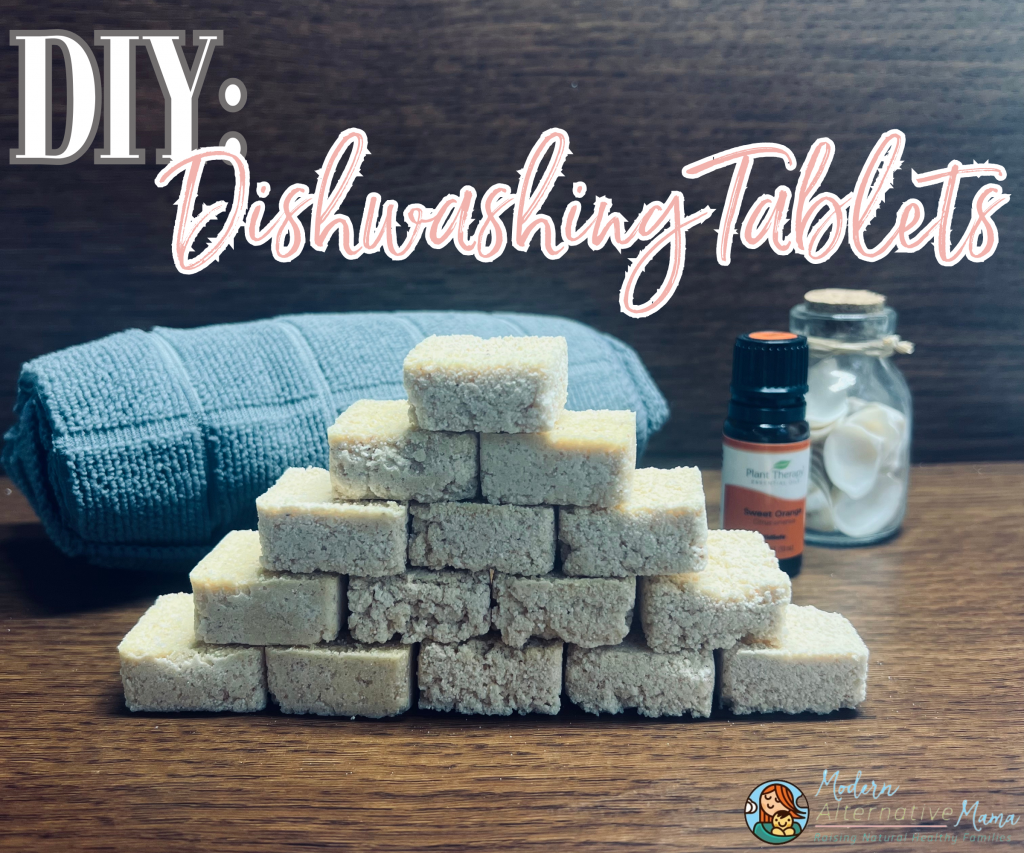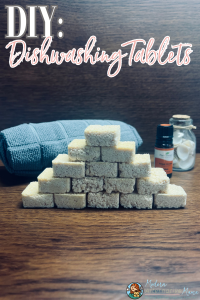We all eat, so chances are, we all have dishes to clean. I used to be one of those people who absolutely refused to use a dishwasher; I would handwash everything, but eventually, life got busy, and I had to compromise. One thing I wasn’t willing to compromise on was the ingredients. There was no way I was using a product with ingredients such as:
Sodium Carbonate, Sodium Citrate, C12-15 Alcohols Ethoxylated Propoxylated, Sodium Percarbonate, Sodium Bicarbonate, Polyacrylic Acid Sodium Bisulfite Terminated, Taed, Polyvinyl Alcohol, Ethylene/Propylene Oxide Copolymer, Alcohol Polyglycolether, Tetrasodium Etidronate, Protease Enzyme, Amylase Enzyme, Manganese Catalyst, Colorants, and Fragrance.
Absolutely not! Think about how many times you’ve opened the dishwasher, and there is visible soap scum still on your dishes. Now think about all the times you may not see soap scum; those ingredients end up in your food and can cause detrimental health consequences.
Of course, I started by using Earthley’s Dishwasher Detergent. That was the only brand I trusted to clean my dishes without compromising quality. I still use them when I am too lazy to make my own detergent, but let’s face it, making your own is almost always cheaper!
Essential Oils You Can Use
First, let’s discuss essential oil options; then, we can get to a homemade dishwashing tablet recipe. Of course, you do not need to add any essential oils to this recipe if you wish not to, as lemon juice (one of the ingredients) alone is great for cleaning properties.
Eucalyptus Globulus Essential Oil
Eucalyptus globulus essential oil is typically made from the leaves of the eucalyptus plant. This essential oil has antimicrobial and antifungal properties, making it a useful ingredient for cleaning and disinfecting (1,2).
Trusted aromatherapist Wendy Robbins cautions that due to its 1,8 cineole content, Eucalyptus Globulus Essential Oil may cause CNS and breathing problems in young children. She cautions against using Eucalyptus Globulus on or near the face of children under ten, and a dermal maximum of 20% is recommended for everyone else (3). Plant Therapy lists their eucalyptus globulus as safe for pregnancy, dogs, and horses, but not kids or while breastfeeding. If you’re looking for a kid-safe eucalyptus, I’d recommend Eucalyptus Dives.
Lemon Essential Oil
Lemon essential oil is typically made from lemon peels that are often discarded. Despite the peels often being discarded, studies have determined that lemon peels are full of bioactive compounds that provide antimicrobial and antifungal properties often used for cleaning (4,5).
Trusted aromatherapist Wendy Robbins says cold-pressed lemon essential oil is phototoxic while steam-distilled is not. A dermal maximum of 2.0% for the cold-pressed lemon essential oil is recommended to avoid the risk of a phototoxic reaction. Additionally, topical use of oxidized lemon essential oil is cautioned against regardless of the distillation method (6). Plant Therapy lists lemon essential oil as safe for kids, pregnancy, breastfeeding, dogs, and horses.
Orange Essential Oil
Sweet orange essential oil is typically made from orange peels that are often discarded. Despite often being discarded, studies have determined that lemon peel contains bioactive compounds that provide antimicrobial and antifungal properties, making it an effective household cleaner (7,8).
Trusted aromatherapist Wendy Robbins indicates no special precautions when using sweet orange essential oil. However, she is cautious about using sweet orange oil if it has oxidized (9). Plant Therapy lists their sweet orange essential oil as safe for kids, pregnancy, breastfeeding, dogs, and horses.
Oregano Essential Oil
Oregano essential oil, not to be confused with oil of oregano, is discussed in-depth in our post When & Why to Choose Oil of Oregano Vs. Oregano Essential Oil is typically made from the dried aerial parts of a flowering plant. Oregano essential oil has antibacterial, antimicrobial, and antiviral properties, all ideal for cleaning (10,11,12).
Trusted aromatherapist Wendy Robbins states there are indications that oregano essential oil may cause embryotoxicity and a moderate risk of skin sensitization. She also recommends a dermal maximum of 1.1% (13). Plant Therapy lists their oregano essential oil as unsafe for kids, pregnancy, breastfeeding, dogs, and horses.
Spearmint Essential Oil
Spearmint essential oil is an excellent alternative to peppermint essential oil, which is not kid-safe. Spearmint essential oil is typically made from the leaves of the spearmint plant, which has antibacterial properties, making it ideal for cleaning and disinfecting (14).
Trusted aromatherapist Wendy Robbins warns that spearmint essential oil is a potential mucous membrane irritant. Wendy Robbins also cautions that there is a low risk of skin sensitization and recommends a dermal maximum of 1.7% (15). Plant Therapy lists their spearmint essential oil as safe for kids, pregnancy, breastfeeding, dogs, and horses.
Tea Tree Essential Oil
Tea tree essential oil is typically made from narrow-leaved paperbark or tea tree plant leaves. Tea tree essential oil has antimicrobial and antifungal properties, which are important when cleaning (16,17).
Trusted aromatherapist Wendy Robbins indicates a low risk of skin sensitization when using tea tree essential oil. Wendy Robbins also recommends a dermal maximum of 15% and precautions against using oxidized tea tree essential oil (18). Plant Therapy lists tea tree essential oil as safe for kids, pregnancy, and breastfeeding but not for dogs and horses.
Dishwashing Tablets
Ingredients & Materials:
- 1 cup washing soda (I used this)
- 1 cup non-iodized salt
- 1 cup baking soda
- 3/4 cup lemon juice (I used this)
- 2 ½ tsp. essential oil of your choice (optional)
- 0.5 oz. silicone mold (I used this)
- An airtight jar or bag for storage
Directions:
Step 1: Add all your dry ingredients (washing soda, salt, and baking soda) into a mixing bowl. Combine well.
Step 2: Add your wet ingredients (lemon juice and essential oil) into the mixing bowl with the dry ingredients. Combine well, ensuring everything is evenly moist.
Step 3: Add 1 tablespoon of the mixture into the silicone mold (there should be enough for 60 tablets) and let sit until the tablets are hardened and completely dry.
Step 4: Remove the dishwashing tablets from the mold and store them in an airtight jar or bag.
Step 5: When ready to use the dishwashing tablets, just insert one tablet into your dishwasher’s soap dispenser and wash alongside a natural rinse aid like distilled vinegar.




Who is Wendy Robbins and why should I trust her?
Thank you so much for your comment. Wendy Robbins is one of the most influential people in aromatherapy after Robert Tisserand and Rodney Young. When I was looking for essential oil sources, I preferred Tisserand and Young, but their safety information was behind a paywall. This led me to Wendy Robbins, who references Tisserand and Young in her essential oil safety profiles. If you wish to learn more about Wendy Robbins, feel free to utilize the hyperlinked sources available throughout the post to visit her website. I hope this helps clear up any questions you may have.